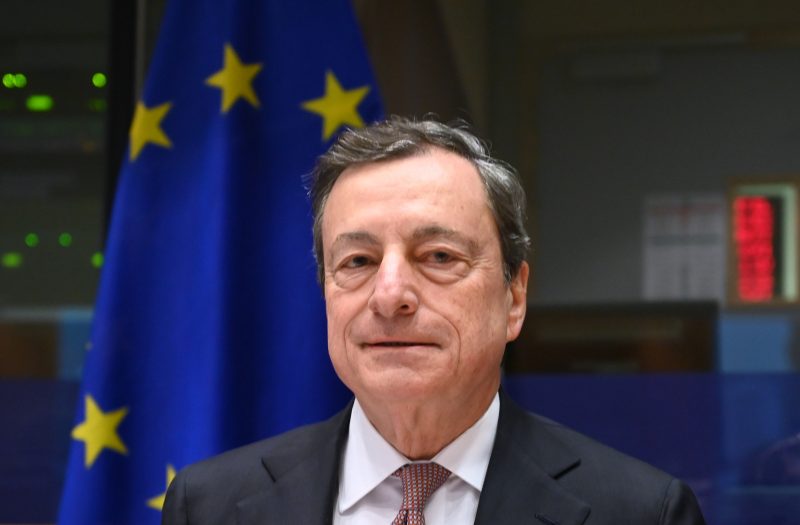ECB to hold course as threats to growth linger
European Central Bank President Mario Draghi is expected to give a downbeat assessment after Wednesday’s meeting of the monetary policy committee (EMMANUEL DUNAND)
Frankfurt am Main (AFP) – The European Central Bank will hint Wednesday at moves to support the eurozone economy but stop short of new action, analysts expect, as the Frankfurt institution eyes lingering political risks.
Policymakers took the unexpectedly aggressive step in March of announcing a new tranche of cheap loans to banks, shoring up lenders as it was forced to slash its forecasts for growth and inflation between now and 2021.
The ECB also pushed back the earliest possible date it could raise eurozone interest rates off historic lows to 2020, rather than summer this year as previously trailed.
Since then no rays of light have broken through the dark clouds of weak economic data and uncertain political outcomes threatening the single currency area.
The outlook for the bloc depends strongly on the outcome of drawn-out trade talks between Washington and Beijing, as American tariffs on Chinese goods have had knock-on effects for European firms.
President Donald Trump has also yet to row back from a threat to slap import taxes on goods from the European Union.
And Brexit talks have extended beyond Britain’s original March 29 departure date from the EU, prolonging the uncertainty over what barriers to trade could spring up when Britain does finally leave.
ECB President Mario Draghi “will have no choice but to give a downbeat assessment” at his news conference Wednesday, analyst Jack Allen of Capital Economics predicted.
– Eurozone patchwork –
Draghi looks set to repeat his long-standing formulation that “an ample degree of monetary accommodation is still necessary for the continued sustained convergence of inflation” to the bank’s target of just below two percent.
Price growth slowed to just 1.4 percent in March, data released last week showed, and there is little sign of livelier economic expansion lifting it back towards the ECB goal.
“Since (the ECB’s) March meeting, the economic data have continued to be disappointing,” Capital Economics’ Allen noted, highlighting weakness in the vital industrial sector visible in both measures of output and forward-looking surveys.
Looking in more detail, the picture is highly mixed across Europe, with Italy appearing set to stew in the recession it entered in late 2018 while Spain and France sport more green shoots.
As for powerhouse Germany, strong internal demand thanks to a healthy labour market and prospering services firms hide an industrial sector suffering from its exposure to the global slowdown.
Against that background, Draghi will likely reiterate that the central bank’s “toolbox” of instruments to buttress growth is ready to be opened should the picture get uglier.
The Italian ECB chief will point to the continuing reinvestments of the 2.6 trillion euros ($2.9 trillion) of government and corporate bonds it bought under its “quantitative easing” programme between 2015 and 2018.
And he could promise details on the new round of cheap loans to banks — known as TLTROs — at a mid-year meeting.
– Struggling banks –
In previous TLTRO rounds in 2016 and 2017, the eurozone’s weaker banks leaped at the chance to borrow at highly favourable interest rates from the ECB.
“If the economy continues to disappoint, the incentives (to borrow) could be more generous,” Nomura bank economist Marco Brancolini told AFP.
Policymakers will also continue the debate kicked off in March about whether to cushion banks against the impact of low interest rates on their bottom lines.
With the ECB’s deposit rate set at -0.4 percent, lenders pay the Frankfurt institution a total of around 7.5 billion euros per year to park extra cash there.
Observers have speculated the central bank could copy Switzerland by introducing a “tiering” system to charge only some deposits the harshest negative rate.
But sparing banks the worst effects could be read by markets as a sign rates will remain lower for much longer than currently acknowledged — distorting the ECB’s messaging around its policy.
Disclaimer: Validity of the above story is for 7 Days from original date of publishing. Source: AFP.


